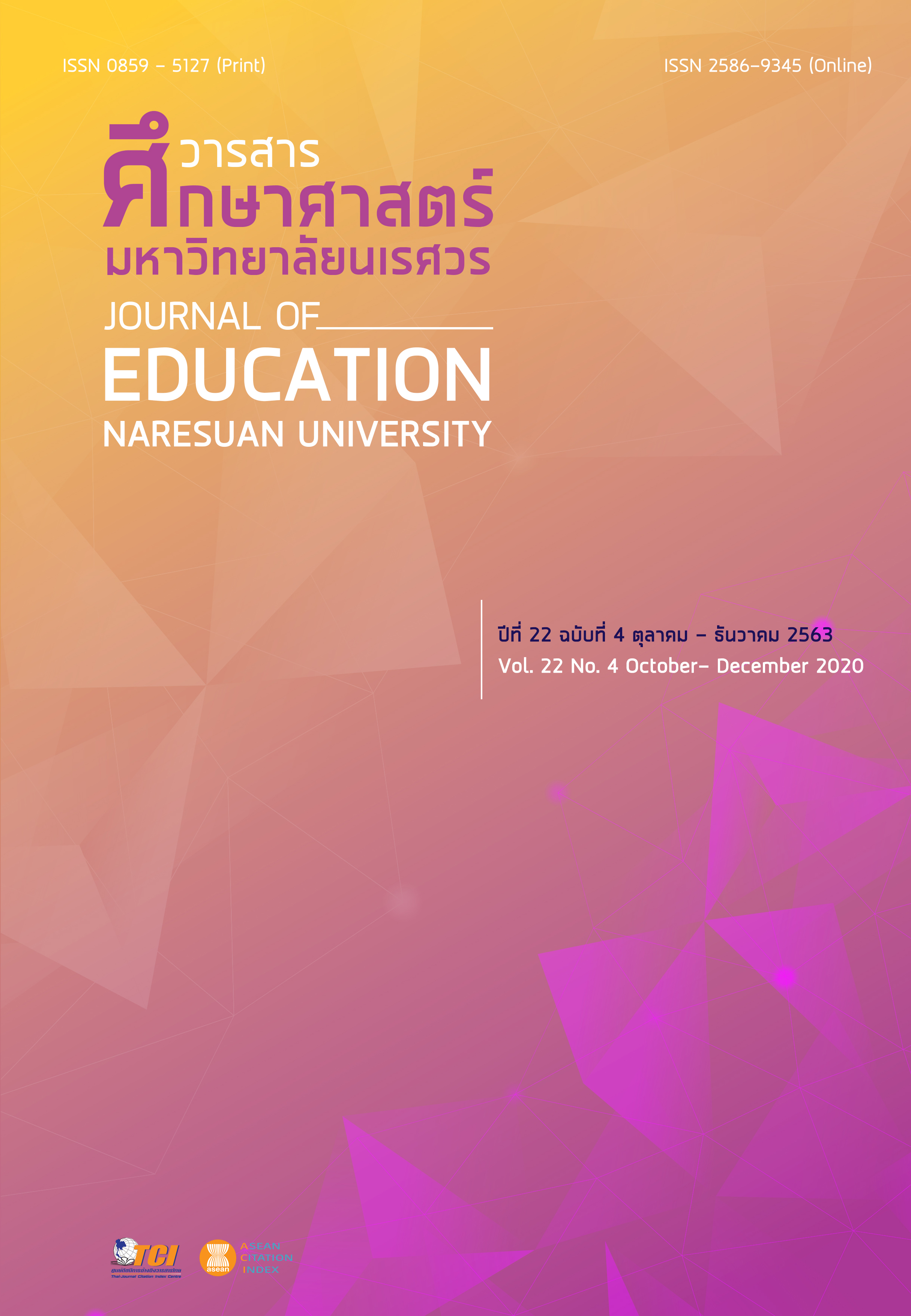THE EFFECT OF SOCIO-SCIENTIFIC ISSUES APPROACH TO ENHANCE HEALTH LITERACY OF IMMUNE SYSTEM FOR GRADE 11 STUDENTS ผลการจัดการเรียนรู้ตามแนวคิดประเด็นทางสังคมที่เกี่ยวเนื่องกับวิทยาศาสตร์ เพื่อส่งเสริมการรู้ด้านสุขภาพ เรื่อง ระบบภูมิคุ้มกัน สำหรับนักเรียนชั้นมัธยมศึกษาปีที่ 5
Main Article Content
Abstract
The purpose of this research was to compare health literacy between learning management using socio scientific issues in topic of immune system for grade 11 students. The sample group was grade 11 students in the large secondary schools in Phitsanulok province. The forty students participated from purposive sampling. Research instrument included 1) three lesson plans based on socio scientific issues in topic of the immune system, namely body prevention and elimination against infectious agents, immunization in body and disruptions in immune system, and 2) forms for health literacy assessment based on quasi-experimental research combined with time series design. The mean value and standard deviation were analyzed using t-test. The result of research was found that the total scores of all students who have been learning using socio scientific issues in topic of immune system has increased continuously throughout the three period of health literacy assessment with statistically significant at .05 level. The summative level of health behavior literacy stood at the second level. It meant that students had adequate health literacy and could prevent themselves from diseases.
Article Details
The owner of the article does not copy or violate any of its copyright. If any copyright infringement occurs or prosecution, in any case, the Editorial Board is not involved in all the rights to the owner of the article to be performed.
References
Driver, R., Newton, P., & Osborne, J. (2000). Establishing the norms of scientific argumentation in classrooms. Science Education, 84(3), 287-312.
Eilks, I. (2010). Making chemistry teaching relevant and promoting scientific literacy by focusing on authentic and controversial socio-scientific issues. Presentation at the annual meeting of the society for didactics in chemistry and physics, Potsdam Germany.
Heijmans, M., Waverijn, G., Rademakers, J., van der Vaart, R., & Rijken, M. (2014). Functional, communicative and critical health literacy of chronic disease patients and their importance for self-management. Patient Education and Counseling. 98. 10.1016/j.pec.2014.10.006.
Jarman, R., & Mcclune, B. (2007). Developing scientific literacy: Using news media in the classroom. UK.: McGraw-Hill Education.
Lin, Shu-Sheng, & Mintzes, J. (2010). Learning argumentation skills through instruction in socioscientific Issues: The effect of ability level. International Journal of Science and Mathematics Education, 8, 993-1017. 10.1007/s10763-010-9215-6.
Ministry of Education. (2005). Student-centered learning. Bangkok: Ministry of Education. [in Thai]
Ministry of Public Health. (2014). Development of Community Care Model for Older People in Thailand. Bangkok: The War Veterans Organization of Thailand. [in Thai]
Office of the Education Council. (2010). Education Reform in Thailand (2009-2018). Bangkok: Office of the Education Council. [in Thai]
Phonsa, T. (2003). Evaluation of health promotion school project in Wang Saphung District, Loei Province (Master thesis). Maha Sarakham: Mahasarakham Universiry. [in Thai]
Ratcliffe, M., & Grace, M. (2003). Science education for citizenship. Milton Keynes: Open University Press.
Reis, P., & Galvão, C. (2009). Teaching controversial socio-scientific issues in biology and geology
classes: A case study. Electronic Journal of Science Education, 13 (1), 1-24.
Sadler, T. D. (2004). Informal reasoning regarding socioscientific issues: A critical review of research. Journal of Research in Science Teaching, 41(5), 513-536.
Saiyod, L., & Saiyod, A. (1995). Measurement and evaluation learning techniques. Bangkok: Suweeriyasarn. [in Thai]
World Health Organization. (1998). Health promotion in teen. Bangkok: Chaicharoen. [in Thai]


